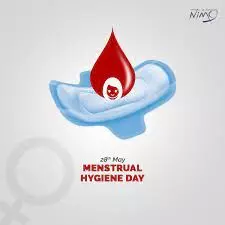- Home
- /
- Trending-News
- /
- Menstruation: The...
Menstruation: The myths and stigma of biological process

Menstrual taboo refers to the social stigma and shame surrounding periods, including discussing periods in public and not caring for the needs of someone menstruating, according to When Your Period Called, a pro-gender publication.
Menstrual Hygiene Day (MH Day) is celebrated annually on May 28, with the 2023 global theme `End the Stigma of Periods’.
Many mothers find it difficult to discuss menstruation with their daughters before puberty. Consequently, when it finally arrives, they are shy about telling their parents or are outright ignorant of what is happening to them.
Some people also believe menstruation makes girls unclean. In many rural areas, menstruating young women are not allowed to take a bath or fetch water from the streams because it is assumed they will contaminate the water.
These also make some girls feel that it is abnormal, and some do not go to school to avoid being mocked by their peers.
Prof. Stella Okunna, Deputy Vice Chancellor, Paul’s University, Awka, said discussing menstruation is not taboo or an abomination.
“In rural areas, many women grew up believing that menstruation was taboo or something unclean, and to this day, they still feel embarrassed when having their periods.
“Menstruation shows you are developing appropriately as a young woman, and you should be happy because you are on the right path to adulthood,” she told participants at a symposium for schoolgirls in Awka.
The event was organised by Zobam Charity Foundation, a non-governmental organisation, to mark Menstrual Hygiene Day, ,
A public health physician, Dr. Nkiru Ezeama, in Akwa says menstrual poverty makes many women and girls resort to unhygienic materials to absorb menstrual blood, which could cause reproductive infections and urinary infections, among other problems.
Ezeama described menstruation as the monthly expulsion of blood and cellular fragments from the uterus that starts at puberty.
According to her, menstruation is a normal biological process and part of a woman’s life, not something to be ashamed of or stigmatized.
She warned of psychological consequences for girls who suffer stigma because of a natural biological process.
She told the participants at the Awka event that “it is sad that many women and girls have their confidence eroded for the mere fact that they menstruate.
“They feel ashamed when they are in their periods, which most times cause mental stress and can lead to anxiety and depression.
“Approximately 1.2 billion women and girls across the world do not have sufficient access to menstrual hygiene products due to poverty.
“Several are deprived of facilities where they can treat menstrual pain, change their pads, and dispose of pads in good facilities.
“According to statistics, one in 10 girls in Africa miss school because of their periods, and about 44 percent of women and girls in Nigeria are experiencing period poverty as they cannot afford N500 sanitary pads,” she said.
The public health physician said that poverty, gender inequality, cultural abuse, and a lack of access to basic services contribute to why menstrual hygiene needs are not met.
Ezeama, therefore, urged manufacturers of menstrual hygiene products to consider biodegradable, hygiene-friendly, and cheaper products that could be easily absorbed in the soil as a way of addressing menstrual poverty.
Similarly, the AIDS Healthcare Foundation (AHF), in partnership with Keffi Local Government (Keffi LG), Nasarawa State, also sensitized the public and students on ending shame and stigma around menstruation.
Dr. Emma Nwabueze, Medical Director, AIDS Healthcare Foundation (AHF) Nigeria, said that the organization was worried about the stigma around menstruation.
He spoke at a mensuration sensitization event organized by the Foundation.
He said the Foundation had instituted a sanitary pad bank in collaboration with Keffi LG, Keffi Primary Healthcare Agency, and Keffi Ministry of Women Affairs to ensure the availability of sanitary pads for girls.
Nwabueze said that the process of menstruation had caused many girls to stay out of school due to their inability to purchase pads and the misconceptions and myths around menstruation.
Also speaking at the event, Dr. Ibrahim Bichi, State Clinical Coordinator, AHF Nasarawa, said: “Our schoolgirls, especially those in school and out of school, need to be educated on menstruation because there is a lot of stigma attached to it.
“Knowledge on menstrual hygiene is also important as it is one of the sources of urinary infection in young girls, which usually comes from the toilet and a lack of personal hygiene when menstruating.
The Chairman Keffi Local Government Area, Mr Muhammed Baba-Shehu was represented by the Secretary Keffi Local Government Council, Mr Muhammed Adamu,
“We will see how we can train our people to produce the sanitary pads to benefit our women and girls,’ he said.
Also speaking, Mrs. Aisha Basha, Supervisory Counsellor Women Affairs Keffi LG, said that “most of our children are shy, especially when they are growing into the reproductive stage.
“They do not want to discuss any issue concerning menstruation or any changes in their body with their parents, as they prefer to hide and deal with the situation themselves.
Miss Gift Ibe, a participant and student of ECWA Government Junior Secondary School Keffi, said: “I learned that when I am seeing my period, I should keep my body clean, take my bath, and change my pad regularly.
“I also learned not to be ashamed when menstruating and to speak to my parents or teachers in school when I have problems or am in pain.
Young women go through a lot psychologically as they grapple with the demands of adulthood. One of such challenges is coping with society’s perception of mensuration. This is one challenge that all stakeholders should pool their resources to address.
In this age of digital media, this is a winnable task if media influencers can devote a fraction of their air time to frivolities instead of this moral assignment.
By Abiemwense Moru



